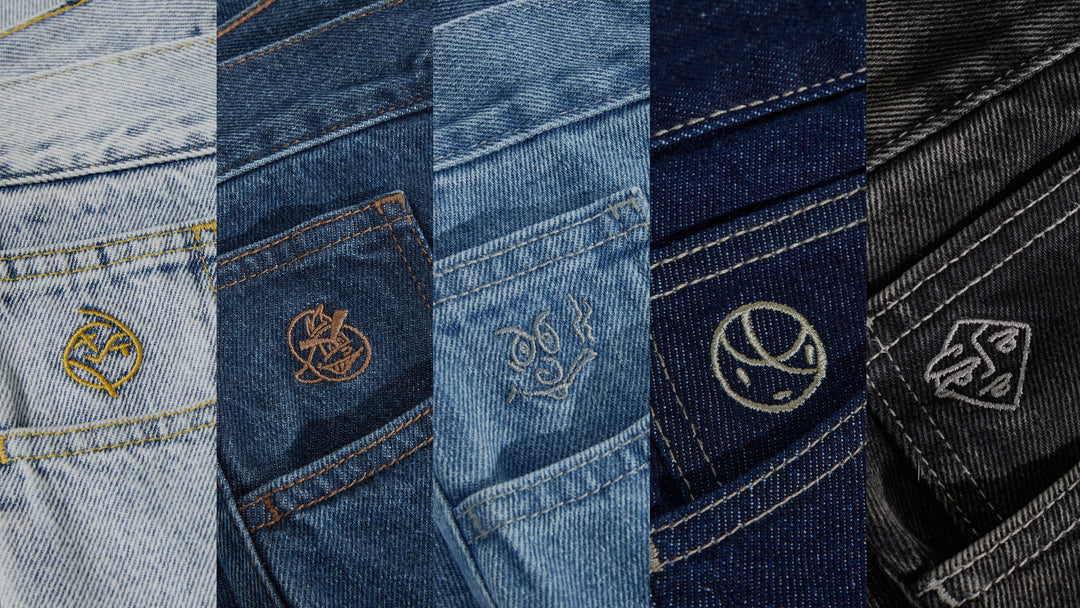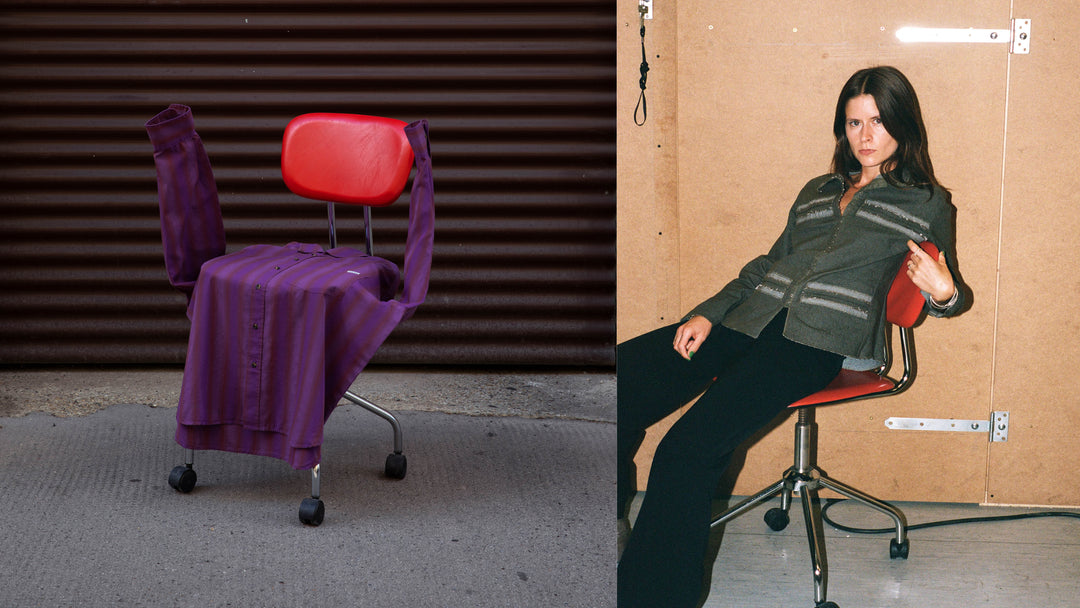Fred Mortagne, also known as “French Fred,” is one of skateboarding's media veterans who has gifted our culture with his incredible work. In the late '90s, he met Pontus, and after a few years, the two ended up touring the world together while working on what would become Cliché's second full-length video, Bon Appétit. In the end, Pontus decided to quit before the video was released, and many of his clips ended up in Strongest of the Strange — a film released 20 years ago that marked the beginning of the Polar universe.
After all these years, we thought it would be interesting to shed some light on those times. So we caught up with Fred to share backstories and insights from the 2000s.
Hey Fred! Cool we can talk about Strongest of the Strange, 20 years after its release.
You're making us feel old! [laughs]
And we're going even further back. How did you first meet Pontus? What were you both up to at the time?
We met a long time ago, when he was still riding for Mad Circle. That was pretty special because he was one of the few European skaters on a US company. I was really hyped on that. The first time we met was in Lyon in 1996. We filmed a couple things, he was with a bunch of friends, and they stayed at my place. That was way before Cliché — which started in ’97. I didn’t start working with Cliché until filming for Bon Appétit in 2003.
What happened when you started working for Cliché and ended up spending more time with Pontus?
Once I joined Cliché, the goal was to make a new video — their second one. So we jumped right into filming. The first trip we took was to Lisbon, Portugal. That’s when I toured with Pontus for the first time. I was stoked because I already knew him, and I really respected his skating. He was unique — always hitting different spots and doing unusual tricks. It was exciting to start working with the team and with him.
“when frustration runs deep, it can become the fuel for change.“
There were many more trips after that — Asia, Australia and so on. Can you describe the vibe of being on tour back then? I feel like it was a very different time.
Oh, definitely. Touring back then was super important. That’s how you brought the team together — traveling, skating, filming, shooting photos for 10 days or two weeks. That first year was great. We filmed a lot. I did lose a tape early on that had some amazing Pontus clips, but we managed to re-shoot some. His energy on those early trips was insane. I remember the guys messing around in the hotel, wrapping him in tape like a mummy.
Was Mr. Klez already emerging back then?
Yeah, totally. That was an early glimpse of the Mr. Klez character. Pontus already stood out — funny, creative, different from the others. His personality really came through.


How was that alter ego received? Skateboarding used to have pretty strict ideas of what was “cool.”
Mr. Klez didn’t come out that often. It was mostly on tour and kind of just between us. Other people didn’t really know about it.
For us, it was hilarious. And I think it gave Pontus a way to express something he couldn’t as just “Pontus.” Like you said, skating had certain codes and coolness standards. So having this character gave him freedom — he could do all this wild, funny stuff without worrying about fitting in. That’s actually a big part of the whole story that there were some bits of him not fitting in everywhere.
What led to him quitting the team right before the video was finished?
At first, it seemed like he fit in well. But when you're on tour with a big group of skaters, not everyone can skate all the time. Especially Pontus — he liked weird spots, unusual places, not the standard ones. Since he was the only one skating that way, he didn’t get prioritized.
So over time, it made sense that he’d get frustrated. He couldn’t skate the way he wanted, or express himself fully. Eventually, it just didn’t fit anymore. He had such a clear vision — about what he wanted to skate, what he wanted to say.
After months of traveling, we were in Australia. He was skating great, landing awesome stuff, Mr. Klez came out now and then. But toward the end of the trip, we had a serious talk in the hotel. He told me it wasn’t working for him — that he didn’t have enough space to skate or express himself.
I could understand and told him, “If you feel like that, I could understand if you would do your own thing and move on.” He had so much energy and potential, but he couldn’t release it within that structure. And Pontus is 100% or nothing.


Some time after that conversation, he quit. Was there tension between him and the people over at Cliché? Like that Bon Appétit sequence where they throw him in the bushes with a note that says, “This is what happened to Pontus”?
I think for Jeremy and Cliché, it was mostly sadness. Jeremy really liked and respected Pontus, and loved his skating. Personally, I was sad that we couldn’t use all the footage — that was disappointing. But I understood. He needed to go do his thing. No one knew what he’d create — and then it blew everyone away.
A lot of that footage ended up in Strongest of the Strange, right?
Yeah, I might’ve just given it to him. I was like, “This footage is too good to go to waste.” It made me really happy to see him use it.
You mentioned his frustration a few times. I looked through the Strongest of the Strange archives and found notes like: “A process born of frustration,” “When life is on repeat, it’s time to move on,” and “A vision to have your own paradise.” Sounds like it matches what you were witnessing.
Exactly. That sums it up perfectly. He was traveling all over the world, but not skating where or how he really wanted. Those lines capture everything.


I saw an old Instagram post where you talked about a dinner in Brisbane. You were telling Dan Sturt stories, and Pontus got hyped.
Dan Sturt was a filmmaker, videographer, and photographer — my all-time favorite in skating. I only met him a few times in California — Geoff Rowley loved working with him. He was a really strange guy. Before I met him, I’d already heard so many wild stories — and they were true.
At that dinner in Brisbane, I shared a few of those stories with Pontus and the crew. He was fascinated by Sturt — this eccentric guy with his own vision. I think Pontus saw a bit of himself in that, even if they're totally different. After that, Pontus kept yelling “gnarly!” the whole night. [laughs]
He was kind of getting into a character — like with Mr. Klez and the ski mask.
Yeah, it gave him a kind of permission to act differently — like a costume that let him be someone else for a moment.
Any particular missions from the early 2000s that stand out?
That last session in Brisbane, filming for Bon Appétit. He landed this amazing line — frontside wall ride on a corner wall, then straight into a tunnel. One of my favorite clips I’ve ever filmed. He was slamming hard but just kept going. That was the real Pontus — happy, confident, loving the spot, giving 100%. And it was after our talk — so maybe he felt relieved, like he could just be himself again.
And that “Message from Fred”?
Oh yeah — I forgot about that. Maybe he asked me to send something goofy. It was just me messing around. I could never be serious with Pontus, especially not in a message. [laughs] It does look cheesy though.
Zooming out: what’s your view on it all now, 20 years later?
When I first watched his film, I was blown away. It was next-level on every front — the skating, the filming, the editing, the vision. I didn’t expect that. But it was 100% him. Looking back, I’m glad he quit — because that gave him space to build something amazing.
And what he’s done since — the films, the creation of Polar — it’s insane. Massive respect. He went from being frustrated and limited to fully expressing himself, completely on his own terms.
What’s really remarkable is that he’s mastered everything — the skating, the filming, the editing, the business, the brand, the marketing. All of it. That’s rare. A lot of skaters get stuck — they ride for brands, adapt to a system, maybe aren’t fully happy, but take the paycheck. Pontus can’t do that. He can only function in his own way.
It took real frustration to push him to reflect, to make a move, and to change everything. And that was a good thing — because when frustration runs deep, it can become the fuel for change.






